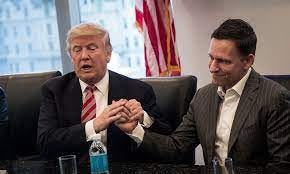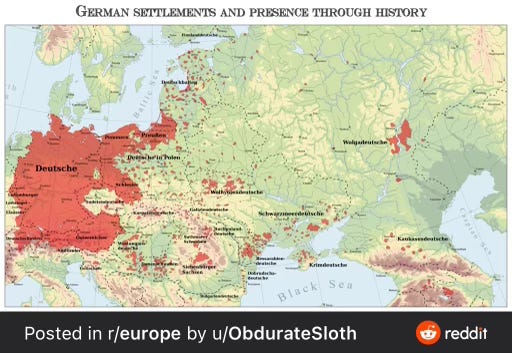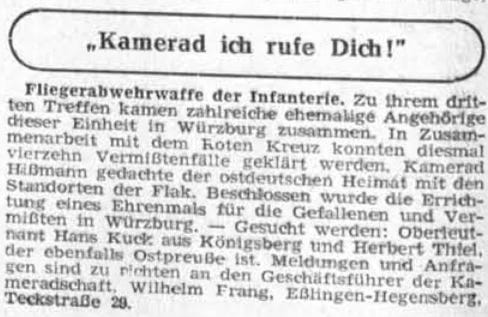The Gen X Files: The Mysteries of Peter Thiel's Father, Grandfather and Grandparents
Why is the nephew of foreign military intelligence allowed to build our defense technology?
I’ve said that I plan to do a write up of the Gen X players in the tech ecosystem. Consider this a much-needed due diligence of the types of people who make investments in Silicon Valley. I’m increasingly asked by law enforcement or intelligence community professionals to help on these matters and I’m always happy to oblige.
I like Peter Thiel but I increasingly cannot defend what he’s doing with Palantir and the investment strategy with Founders Fund. Buying up middle class housing smacks of an op. (As I often joke when asked about Founders Fund — we wanted flying cars but we got Stemcentrix — a biotech company that didn’t work but still enriched the partners.)
What’s more, I think Peter showed extremely poor judgment to invest in Johnny McEntee’s right-wing dating app. (Johnny’s family ties to casino interests are pretty weird.) It was good of Peter to leave the board of Facebook but by then much of the damage had already been done. I reluctantly agree with John Ganz’s writings on Peter but think that the focus on Peter’s ideas, much as the focus of Musk’s sex life, misses the real story. Follow the money and the families! Many of Peter’s ideas do seem to carry with them a tinge of Nazism, especially his support of Carl Schmitt’s “state of exception.”
I want to be very clear. I think there’s a chance for these venture funds and their Gen X leaders to get with the program but that that chance is receding rapidly. There is a hope that some of these types can be turned to serve Uncle Sam but increasingly I think that those hopes are diminishing. Peter doesn’t really listen to me anymore and though we speak through intermediaries, my friends in the intelligence community have more or less persuaded me that the best course of action for him is to retire. I hope that’s not true.
Peter Thiel once told me his father was a truck driver. In fact Klaus Thiel was a mining executive and project manager, who has not become an American citizen. Klaus Thiel’s American colleagues called him “The Gestapo” and Peter visited Klaus at least once in Papa New Guinea.
“My dad worked these large engineering projects,” Thiel told author Luke Burgis. “One of them was at Lihir Island, off the coast of Papua New Guinea. I remember that on the way to the airstrip there was this concession stand with people standing around. They were all “businessmen” — or at least playing the role of businessmen. But they would just stand around and chat. Nobody was buying or selling anything.”
(Was he talking about Papa New Guinea? Or much of his New Right investing? I wonder…)
Klaus Thiel helped mine the uranium in Namibia for the South African, Israeli, French, and Chinese atomic bombs. (Most recently Rössing was sold to China National Uranium Corporation Limited.)
Peter’s father has been really been examined and neither has his uncle Herbert.
This October Peter will be 55 — the same age when his Uncle Herbert died. I’ve never heard him mention Uncle Herbert. (Peter once told me that he had a great uncle who served in the Bundesbank, which I haven’t confirmed despite my best efforts.)
In any event you’d think that someone so interested in longevity research would mention that his uncle had died in the prime of life and yet Peter never seems to mention really anything about Herbert. Curious.
Herbert was born in Domnau, Prussia in July 1941. Herbert’s mother — Thiel’s grandmother Martha Fohlmeister — was an Estonian German who, thanks to the conflict, was forced to relocate to Domnau in Königsberg. (Recall that from 1939 to 1941 Nazi Germany and Russia were on the same side. For raisons d’état, Germany and Russia seem to always wind up on the same side not withstanding the alleged Cold War interlude.)
In any event the family Thiel found itself on the move once again and Thiel’s grandparents eventually resettled in Bielefeld where the British kept their garrison after the fall of the Nazi government. Were they POWs? Were they refugees? It’s hard to tell.
Today Domhau is Domonova, Koenisberg — a country which is no longer a part of Germany at all but a part of Russia now called Kalingrad. Herbert took an American wife — Ann — who was a postal worker. The couple had no children.
Just how and why Herbert found himself in Kentucky I haven’t been able to find out. Indeed Herbert Thiel is a somewhat elusive figure. A friend directed me to a newsletter from 1961 which was published by and for East German exiles.
Think of this: the founder of a key part of the military industrial project — Palantir — has an uncle who is mourning the East German war dead. This is decidedly odd.
Why does Thiel have these close relationships with the military and intelligence community? To judge that, we have to look closely at the founding of Palantir.
In-Q-Tel cofounder Gilman Louie explains that he took the Palantir meeting as a favor to an unnamed venture fund that didn't see the value in Palantir but valued its relationship with Thiel:
I had a venture fund call me up and say ‘Peter Thiel we really like, and he's a big time dude, he did PayPal, we made a lot of money off of him, but he's talking about using algorithms for PayPal to solve terrorist things, and we don't even know what Peter is talking about, and we don't want to do that deal, but we want to keep the relationship, can you please meet with him? And if you can just do something with him so we can preserve the relationship?’
There are some questions today about whether or not Palantir even works. What if you could force a country to spend money on a national security product that doesn’t work? What a coup that would be! You have to wonder, especially given that Thiel and Lonsdale backed Ubiome, a similarly fake biotech company. The founders are now on the run but won’t be extradited from U.S. ally Germany. Weird.
I come from a line of spies and such. I’ve had family in the FBI, Army, Navy, CIA, and so on. We read and discuss spy movies and famous defections. Most recently I’m reading a book about The Spy Who Would Be Tsar: The Mystery of Michal Goleniewski and the Far-Right Underground (2021).
Goleniewski was a famous defector who helped uncover what he called the Die Hacke network — a supposed secret alliance between West German and Soviet intelligence.
This is how author Kevin Coogan describes it:
“I examine Goleniewski’s claim that the Soviet Union had established a postwar intelligence network in both Eastern and Western Europe with high-ranking ‘former’ Nazis. I also reveal how information from Goleniewski led to Heinz Felfe, a senior counterintelligence officer in the West German Federal Intelligence Service BND, being exposed as a Soviet spy.”
Does this sound like anyone you know?
Given that Peter is German, there’s always the question of Nazi ties. A friend has taken an initial pass at the National Archives to see if anything might pop as concerns Peter’s grandfather, Willy, but his birth date has proven elusive and there are too many people with the name “Willy Thiel” who are members of the Nazi party.
If we assume that Thiel is a bad actor, we might ask why. Is he simply larping?
Max Chafkin’s book, The Contrarian, p. 2, suggests an option.
Though commonly understood as a board game, D& D is less about winning and losing than it is about fantasy storytelling. The game called for each boy to create an imaginary character for himself. Wizards, barbarians, druids, and monks were among the many options, each with different skills. Wizards cast spells, barbarians are ferocious in combat, and so on. A final player took on the role of narrator and referee; he was in charge of coming up with an adventure for these characters. This narrator was known as the dungeon master, and although the role was supposed to rotate, Peter—skinny, brilliant, and painfully, painfully serious—would always try to claim the job for himself. “You get to determine the reality,” said a man who used to play with him. “He liked that quiet control.”
In recent years Thiel has preferred loud control to quiet control but the desire for power at all costs remains and prompts new questions.
How real is any of this?
Can you force someone to imitate the wrong things?
Is Palantir itself an intellectual cul de sac?
Is it all a game?
We will continue to look closely at the so-called leaders of Silicon Valley. If you have a tip please let me know.








It should be relatively simple to discover who was a Nazi since the Nazi Party was so big on keeping records. The same should also be true for those who owned slaves. Unfortunately, there are people who are highly skilled at burying records. Can you imagine how different things might be if we could easily access any public records?
Who benefits from obscuring certain public information? Maybe it’s the people who still benefit from their malevolent inheritance.
Wonder if there's any connection to Adolf Thiel?